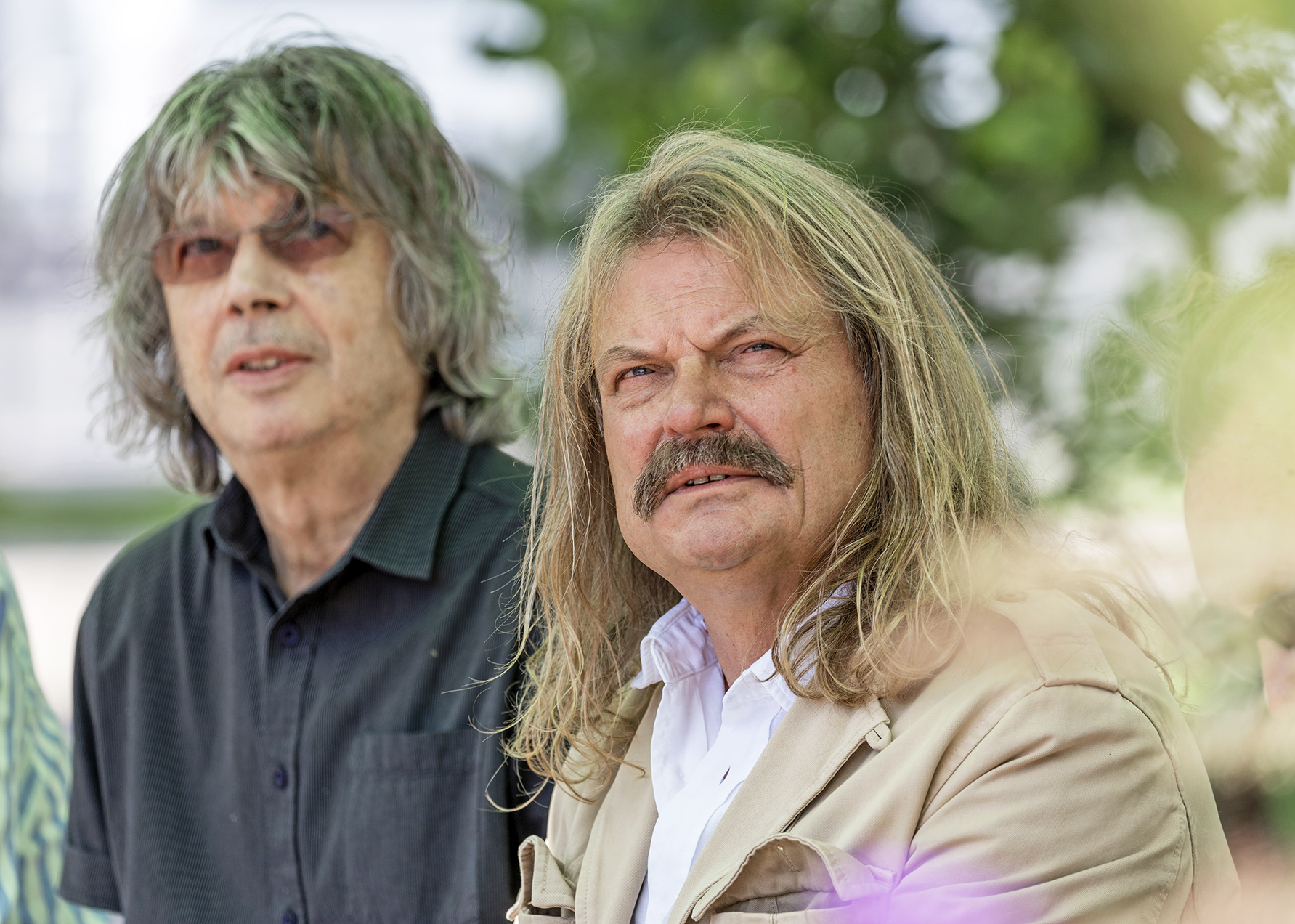János Bródy: The Singer Poking the eye of the Establishment

Hungarian songwriter and singer János Bródy (right) with German-Hungarian musician Leslie Mandoki at a press conference in Budapest Park on July 13, 2017.
Photo by posztos / Shutterstock.com
I would never have heard of Hungarian singer-songwriter János Bródy if someone hadn’t drawn it to my attention that he is celebrating his 75th birthday this year.
Bródy is a revered artist in this country. As someone put it to me, “Ask any Hungarian, especially over the age of 40, about Bródy and his career as a bandleader and solo artist, as well as his stage musicals, particularly ‘István, a király’ (Stephen, the King). It’s like asking any grey-haired Brit or American about The Rolling Stones or Crosby, Stills & Nash.”
I would guess, though, that Bródy is all but completely unknown outside Hungary. He also sings and writes only in Hungarian, which, with the best will in the world, doesn’t help.
Bródy was born in 1946 in Budapest. He joined the band Illés (Elijah) in 1964 as a singer. Judging by the cuts collected on the 2005 compilation “Nehéz az út” (The Road is Hard), he was pretty good. I don’t know what he’s singing about, but the music ranges from sophisticated psychedelic stuff with adept playing and smooth harmonies like “Sárga rózsa” (Yellow Rose) to the belting “Little Richard.”
It being the 1960s, Illes’ music was influenced by bands like the Beatles and the Stones. By 1967, Bródy was writing his own lyrics. Like Dylan or Lennon and McCartney, he wrote in code. But, where they were mainly writing about drugs and sex, Bródy was secretly criticizing the Hungarian communist regime. He has never stopped making his music from a position of opposition to whoever is in power in Hungary.
The ambiguity of Bródy’s lyrics helped make Illés’ gigs an outlet for implicit protest by the band’s fans. But their popularity put them into a musical straitjacket. By the early 1970s, they were experimenting with mixing Hungarian folk and rock and roll, but their fans demanded less challenging stuff.
Police Baiting
Bródy continued speaking out. At an event in Diósgyőr (186 km northeast of Budapest) in 1973, he said from the stage (and I’m translating roughly, here): “We also wish to thank the police forces. Many of you came here yesterday from Miskolc and couldn’t sleep anywhere. For them, the police provided shelter, even if it was not as comfortable as the bed at home, and let them out this morning, asking them if they slept well and wishing them fun for tonight.”
The resultant fine and one-month ban from performing caused Illés to begin to fall apart. After they folded later in 1973, Bródy started the band Fonográf with some former members of Illes and new blood. I’ve only listened to 1978’s “Útközben” (On the Way), which is competently played rock and roll with an Eagles country-rock influence on some cuts.
Bródy’s lyrics were as inflammatory as ever, and Fonográf was heavily censored by the communists. The 1973 album “Jelbeszéd” (Sign Language), made by Fonográf collaborator Zsuzsa Koncz, written by Bródy, was taken out of stores and destroyed.
Despite this, you can find “Jelbeszéd” online; it was re-released in 2002, and it’s well worth the listening. Koncz has a powerful, pure voice with a tone that I think of as particularly Hungarian. Like Bródy, she is an icon in Hungary.
“Sign Language” is a particularly adept way of describing what Bródy has always done: send coded signals to his audience.
In 1980, he released his first solo album, “Hungarian Blues.” As time went on, his writing has increasingly expressed disappointment with life in newly democratic Hungary, with lyrics sung in a seasoned, somewhat world-weary voice to an often wistful musical backing.
Fulfilled Disappointment
He has continued to record albums and give performances as well as write plays. In true Hungarian style – and again, this is a rough translation of the words on his website – he performs “with an ironic smile, offering a short, temporary happiness between hopeless love and fulfilled disappointment, consoling the unrealized dream.”
Bródy’s solo albums have all gone gold or platinum in Hungary. He’s also published several books of his lyrics which have sold well. In 2001, the singer-songwriter was diagnosed with cancer and had a kidney removed. Fortunately, he was able to continue making and performing his art.
After listening to his latest album, 2020’s “Gáz van, babám!” (There’s Trouble, Baby!), I still struggle to warm to the music, but I do wish I could understand what he’s singing about. This is particularly the case with his 1984 recording of the song “Ha én rózsa volnék” (If I Were a Rose), an anthem for Hungarians who came of age in the 1960s.
Alongside the new album, Bródy is releasing another book of his lyrics, “Saját hangon” (In my own Voice). Researching this article, I asked a fan who saw him a few times in the 1980s and 1990s what she felt about him.
She said, “I like his lyrics very much. He uses simple words in a beautiful way. As a performer, he’s charming but also humble. My mother loves him too; she was a fan in the 1960s. When we listen to his music together, we’re not a daughter and mother. We feel the same age: we are both young. This is the power of Bródy’s music.”
I asked my friend László Kovács, of Hungarian reissue label Moiras Records, for his suggestions on where to start with Bródy. He recommended:
1. Illés, “Goodbye London”
2. Fonográf, “Hunyd le a szemed” (Close Your Eyes)
3. Bródy, “Földvár felé félúton” (Halfway to Földvár)
4. Brody, “Ha én rózsa volnék” (If I Were a Rose)
5. Brody, “Ne szólj szám” (Don’t say numbers)
Moiras is a great place to start if you are interested in getting to grips with Hungarian popular music. Find out more at www.moiras.somoskiado.hu.
This article was first published in the Budapest Business Journal print issue of December 3, 2021.
SUPPORT THE BUDAPEST BUSINESS JOURNAL
Producing journalism that is worthy of the name is a costly business. For 27 years, the publishers, editors and reporters of the Budapest Business Journal have striven to bring you business news that works, information that you can trust, that is factual, accurate and presented without fear or favor.
Newspaper organizations across the globe have struggled to find a business model that allows them to continue to excel, without compromising their ability to perform. Most recently, some have experimented with the idea of involving their most important stakeholders, their readers.
We would like to offer that same opportunity to our readers. We would like to invite you to help us deliver the quality business journalism you require. Hit our Support the BBJ button and you can choose the how much and how often you send us your contributions.








